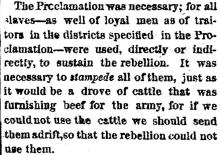Two Great Truths.
Secretary Chase, in his speech at Cincinnati a few evenings since, stated two propositions which should never be lost sight of, and which should be so persistently repeated that no man need plead ignorance as excuse for not understanding them. The one was that the issuing of the Emancipation Proclamation was a necessary act in the suppression of this rebellion, and the other truth flows directly as a consequence, to with that that Proclamation having been made, good faith demands that it be carried out. Those two facts underlie everything connected with this war, and they will certainly be the foundation stone of the next Presidential canvass. No man who ignores those two facts can receive the nomination of the Unionist, and no man a vowing those doctrines can receive the support of the Democratic party under its present leaders.
That such a Proclamation came within the power of the Administration no man can deny who admits that the power of suppressing rebellion lies within the Constitution, or who admits that the President can rightfully use such means as shall most effectually crush rebellion. No same man will deny that the Government should strike its blow at the rebellion where it will fall with greatest forces, and no man, who is willing to see can deny that the labor of slaves was the strongest support the rebellion had; without which it could not long last, with which its end could not be foretold.
Being made, of course the Proclamation must be carried out, or the Administration is base. We imagine no man will deny that, in the individual case where a slave gives his services to the Government on conditions of receiving his freedom, the bargain is a good one for our Government. All the property the slaveholder has in his negro is the right to his service, and surely the government has a right to all of every man’s property, if it be necessary in the crushing of this revolt. Every loyal man who loses his slave’s services can make his claim for remuneration, as if Government had take the services of his horse. If the owner is no loyal he can make claim for remuneration.
The Proclamation was necessary; for all slaves— as well of loyal men as of traitors in the districts specified in the Proclamation— were used, directly or indirectly, to sustain the rebellion. It was necessary to stampede all of them, just as it would be a drove of cattle that was furnishing beef for the army, for it we could not use the cattle we should send them adrift, so that the rebellion could not use them.
If the Administration had the power to issue the Proclamation, it should be enforced; if the issuing has resulted in great good to the loyal cause— as everyone can see if he looks out of his eyes—then its enforcement is not only right, but we should be rejoice to fulfill our part of the contract.
"Two Great Truths," Cleveland (OH) Daily Herald, October 15, 1863, p. 2.

